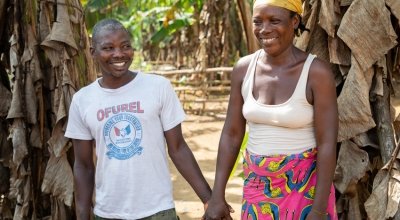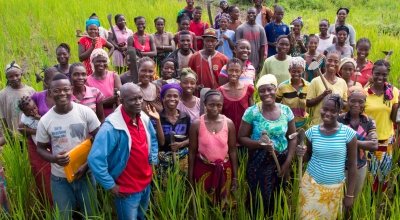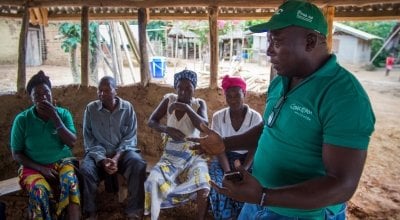
Read our 2023 annual report

Knowledge Hub
Ebola relief: a day in the life of Concern’s quarantine team in Liberia
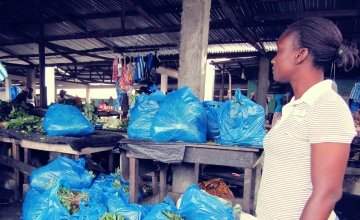
As cases of Ebola fall, normality is beginning to return to Liberia. But as children return to schools and workers slowly get back to their jobs there are still some areas where the deadly epidemic is spreading. In these areas, quarantine is vital in preventing the spread of the disease. We spend a day with one of Concern’s quarantine teams working in Liberia’s last Ebola hotspots.
Quarantine in Liberia
Discovering that a family member has been struck by illness is a time of intense anxiety. When they are ill, we want to stay by their hospital bed and support them. If they pass away, we need to be able to grieve. The contagiousness of Ebola, however, disrupts these important coping mechanisms. Currently in Liberia, members of a household who have come in contact with Ebola are required to stay at home for 21 days under observation.
While this quarantine is vital to safeguard the family and community from further loss or illness, it can cause isolation and stigmatisation.
Keeping in contact
Concern’s quarantine team are visiting up to 40 households a day to keep up that human contact. These teams bring vital supplies, whether food, radios, soap or activity books for children. Most importantly, they can check in on the wellbeing of those households in quarantine.
Ruth and Sharon
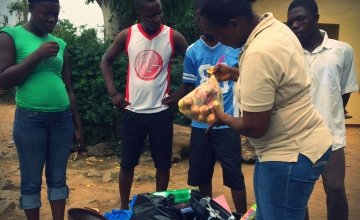
Each team consists of two quarantine field monitors, who work together to provide this much needed service. Ruth Wilmot and Sharon Diayer make up one of these teams. They previously worked with Concern’s Ebola response in the Grand Bassa region of Liberia. Now that area is Ebola-free, they have moved to Montserrado where cases are still occurring.
Their day begins by loading up cars with non-perishable food items. The pair take a drive to the market to stock up on fresh greens and fish, the cornerstones of the Liberian diet.
First stop
Sharon and Ruth’s first stop is to St Paul’s Bridge. When they visit at the beginning of February, there has been a flare-up in the number of Ebola cases. Sadly, a member of the community has passed away. Because of this, four houses are in quarantine. The team go to visit the bereaved; a woman and her three brothers, to see how their quarantine is going.
On arrival Sharon and Ruth find that the three brothers have gone out fishing. Despite the quarantine, the woman explains that they felt that they needed to provide food for the families. They also fear the stigma linked to Ebola.
Community leaders
To encourage solidarity and support, Sharon and Ruth have to work with community leaders to distribute supplies and explain why the quarantine system is important. The leaders help to share information on how to stay aware of the symptoms of Ebola and make sure critical care can happen quickly if one of the family falls sick.
After stocking up the family with food, cleaning gear and phone cards to stay in contact with the outside world, Sharon and Ruth head off for their second visit of the day.
Second visit
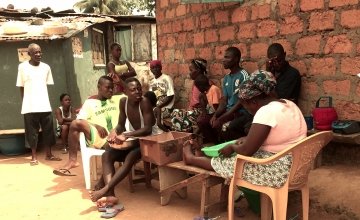
As they arrive in Gbagtea Town, the team are happy to find that the family they’re visiting are sticking to their quarantine. The whole family, from energetic toddlers to serene grandfather, are sitting together outside the house. One of the members of the family has very recently become sick and is in an Ebola treatment unit (ETU).
While they are worried about her chances of survival, in fact around 1,400 people treated in Liberia’s ETUs have survived Ebola. Early treatment means that their family member will have a better chance for pulling through. She seems to be doing well, so the family are in good spirits.
Ruth and Sharon find that the family’s community ties are still intact. Neighbours bring them drinking water and are finding ways to support them through their 21-day quarantine.
End of the day
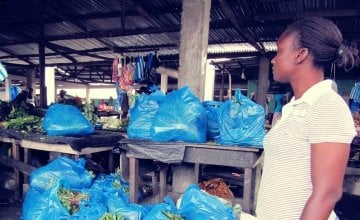
Ruth and Sharon leave with some sense of relief. There is hope that better support systems and the spread of information is helping to turn the tide against the epidemic. By keeping those hit by Ebola integrated into their communities, the work of quarantine teams and community leaders will be essential in Liberia’s post-epidemic recovery.



